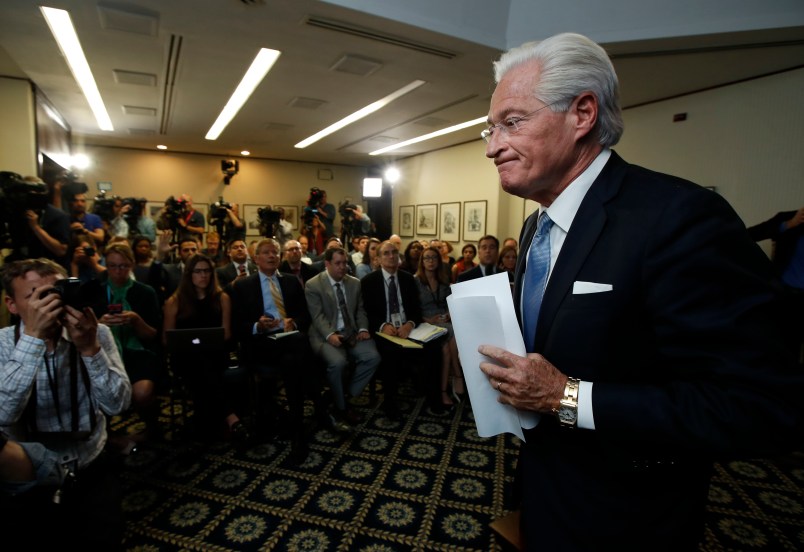After James Comey testified earlier this month that he directed a friend to share descriptions of his private conversations with President Donald Trump with a reporter, Trump and his private legal team branded the fired FBI director a “leaker,” pledging to immediately file a complaint against him for sharing “privileged” information with the media.
Two weeks later, no such complaint has been filed, and the ballpark date for when Trump’s legal team says it will be filed keeps sliding later into the summer.
“It’s still being worked on,” Mark Corallo, spokesman for the legal team being led by Trump’s longtime personal attorney, Marc Kasowitz, told TPM late last week.
Attributing the delay to “an effort to be thorough,” Corallo, who worked as a Justice Department spokesman during George W. Bush’s administration, said that a complaint could be filed with “either or both” the Department of Justice’s Office of the Inspector General or Office of Professional Responsibility.
“Both are appropriate offices within the Department of Justice to receive this kind of information,” he explained, adding that a “submission” about Comey’s testimony to the Senate Judiciary and Intelligence Committees was also possible.
Reports first surfaced about an impending complaint against Comey the day after his June 8 testimony, to be filed “early next week.” When nothing came by June 13, Corallo told Reuters the filing “may well slip to next week.” A second week came and went with no filing announcement, although “a source close to Trump outside counsel” told the Washington Examiner on Friday that a complaint could come the week before the July 4 holiday.
Asked for confirmation on Monday, Corallo told TPM via email only that he would “know more in a day or two.”
The complaints, if and when they come, will have little teeth, as the DOJ has limited jurisdiction over former employees. As CNN reported in June, if investigators look into the details of Comey’s testimony and find wrongdoing, the most they can do is make a note in Comey’s permanent file.
In filing a complaint, the President would appear to seek a measure of vindication against a former employee who has openly criticized his administration since being abruptly fired in May. In his appearance before the Senate Intelligence Committee, Comey testified that he kept memos of his one-on-one discussions with the President out of concern that Trump would “lie” about their interactions. Comey then asked a friend to share his descriptions of those memos, which recounted Trump’s requests that he pledge loyalty and that he quash an FBI investigation into ousted national security adviser Mike Flynn, to the New York Times.
Trump and his attorneys pounced on that revelation, with Kasowitz calling Comey a “leaker” who shared “purported memos of those privileged conversations.”
Legal experts and lawmakers have pushed back on the notion that Comey orchestrating the release of the contents of his memos to the press amounted to leaking. The former FBI director testified that he took care not to divulge any classified information either to the press or before the Senate, and he was no longer a government employee when he discussed his private interactions with Trump. The President did not assert executive privilege over Comey’s testimony.
Threats of legal action that ultimately fail to materialize are part of doing business in Trumpland, where the President continues to employ the same tactics he honed during his years as a real estate mogul and reality TV host. As CNN noted, Trump threatened during the 2016 campaign to sue Sen. Ted Cruz (R-TX), the Louisiana Republican Party, The Washington Post, The New York Times and the dozen-plus women who accused him of sexual misconduct. None of those suits ever materialized.
Bloomberg noted that Trump is also prone to predicting that major new proposals will come in just “two weeks,” a deadline that his administration routinely misses.
Trump famously followed through with one 2006 case against “TrumpNation” author Timothy O’Brien, who wrote that Trump is worth hundreds of millions of dollars less than he claimed at the time. After Trump admitted under oath to making some 30 past false statements, a judge tossed the suit.







Could it be they have no friggin’ clue as to what they are even doing?
They’re only just discovering that this isn’t the same as bullying some building contractor they’re trying to stiff. Threats and bluster don’t work the same way in this environment.
Trumpers, in a nutshell:
A: I’ve got the biggest dick you’ve ever seen, gorgeous! It’ll blow your mind!
B: Well? I’m waiting.
A: I, uh, need a moment…GODDAMN FEMINAZI!!!
Maybe the fact that it wasn’t a leak, had no classified info and was from a former employee has a little something to do with it.
The suit is frivolous on its face and preposterous in its attempt to frame it as something that it clearly isn’t.
The Trumptees are postponing the loss in hopes that something else pops up to make it seem less loserish.
“We’re working on it. We’ll have it in two to three weeks. It’ll be very unique and fabulous. Believe me”